Is Mayor Emanuel forcing CPS to pay $70 million for high school police protection?... Board budget Power Points show how big the Big Lie about this year's 'deficit' really is part of a corporate media synergy with CPS to provide fictions rather than budget facts to the public
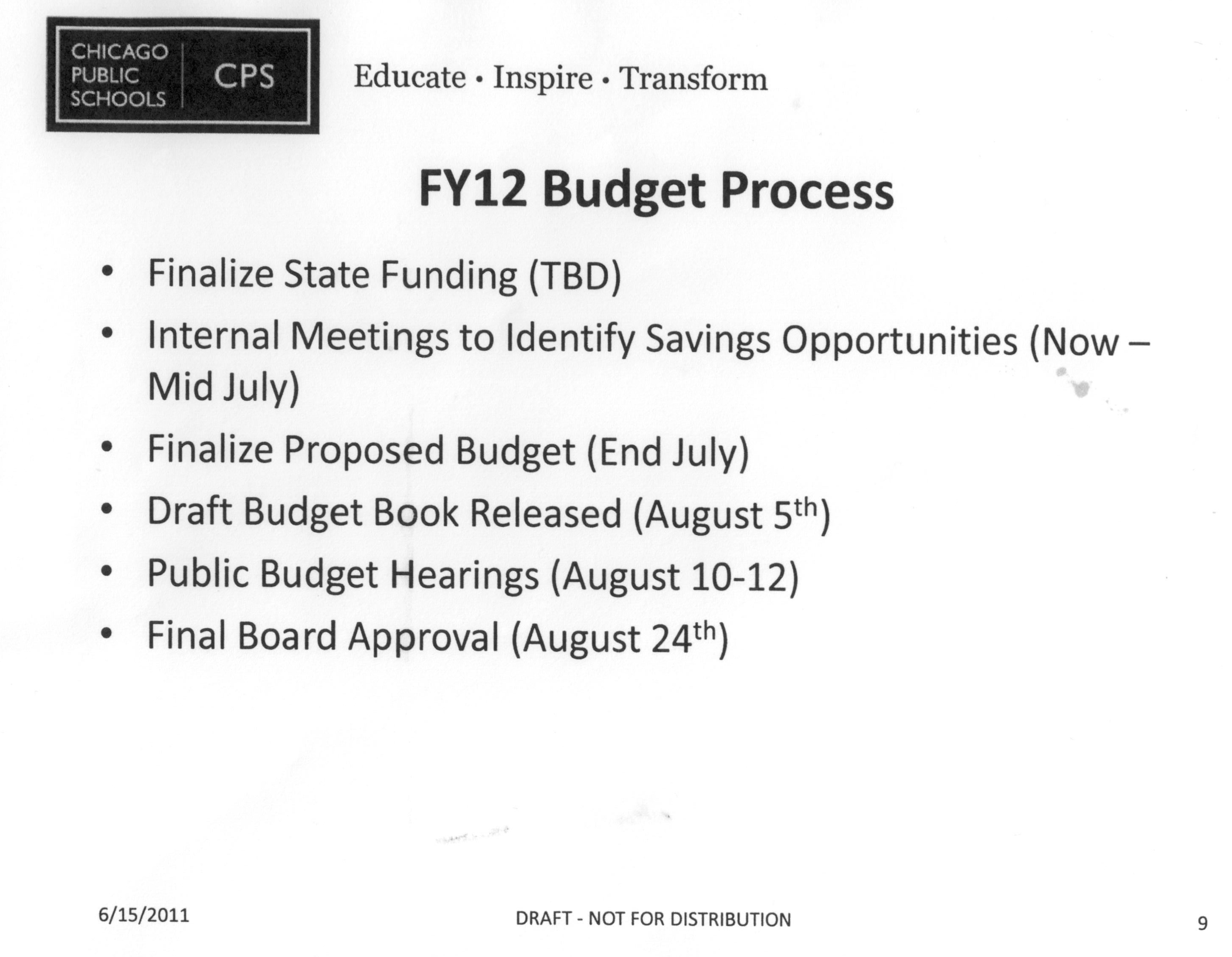 Once again, CPS is scheduling its public release of the budget for August, instead of June as required.On June 15, 2011, the Chicago Board of Education's seven members heard a Power Point presentation from the Board's new "Chief Administrative Officer," Tim Cawley. The presentation was supplemented by comments from the Board's new Treasurer, Melanie Shaker (who has been with CPS for less than one year) and "Chief Human Capital Officer" Alicia Winckler (who has been with CPS for eighteen months; prior to CPS she was with Sears Holdings).
Once again, CPS is scheduling its public release of the budget for August, instead of June as required.On June 15, 2011, the Chicago Board of Education's seven members heard a Power Point presentation from the Board's new "Chief Administrative Officer," Tim Cawley. The presentation was supplemented by comments from the Board's new Treasurer, Melanie Shaker (who has been with CPS for less than one year) and "Chief Human Capital Officer" Alicia Winckler (who has been with CPS for eighteen months; prior to CPS she was with Sears Holdings).
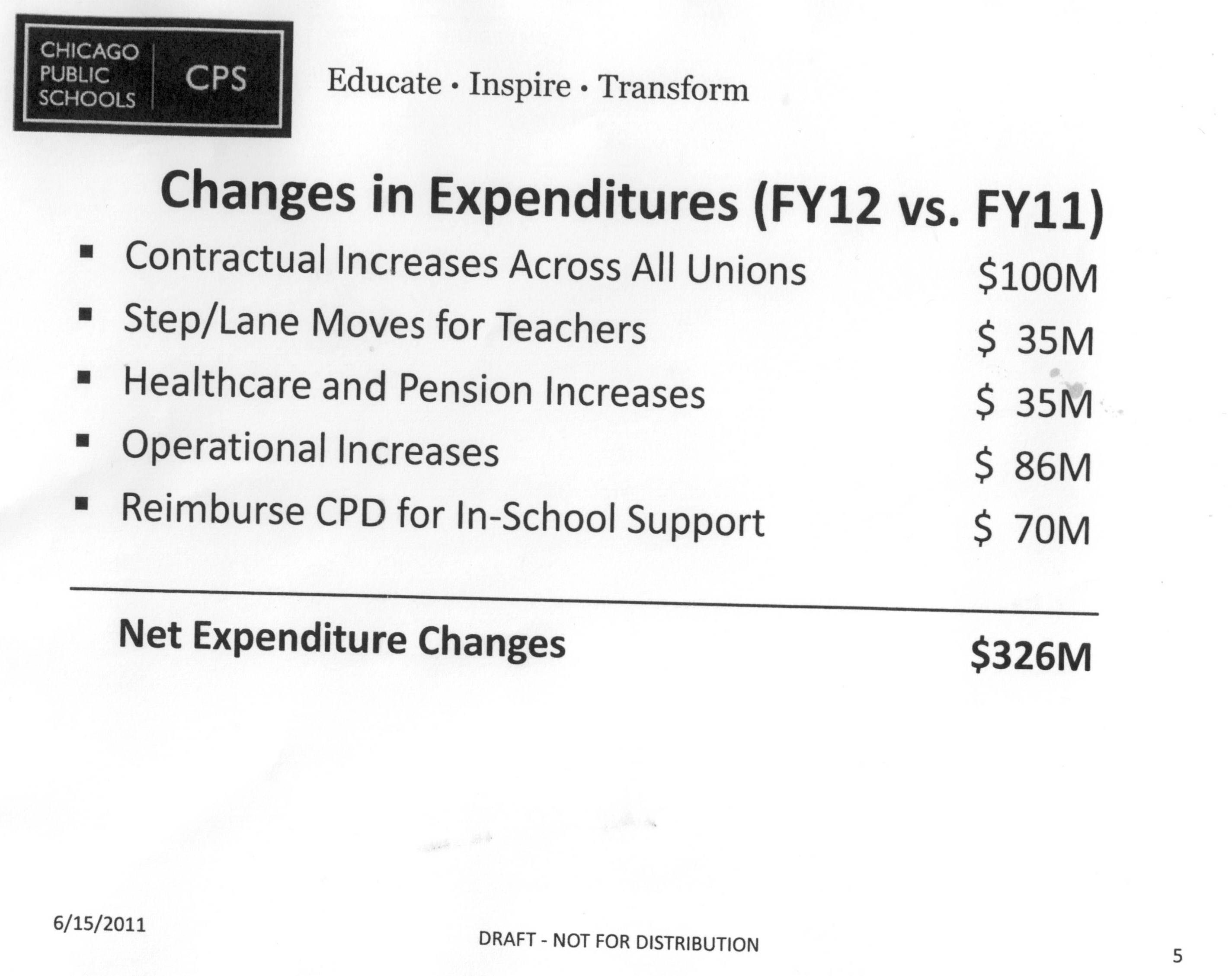 POWER POINT PAGE FIVE: Page 5 of the CPS Power Point budget presentation on June 15, 2011 claimed that CPS has to pay the City of Chicago $70 million this coming year (FY 2012) for "In-School Support" (i.e., police officers assigned to most of the city's high schools and a few other schools). Board Reports show that CPS owes no such amount, with the most recent "Intergovernmental Agreement" setting the annual bill at between $8 million and $12 million per year through 2014. Graphic from the CPS Power Point used by the Board's officials at the June 15, 2011 meeting.First, let's talk about the biggest lie told in the June presentations. Everyone who has critically examined the budgeting of the Chicago Board of Education over the previous decades has seen that CPS always has some kind of problem — a "deficit," or a "projected shortfall," or a somethingorother that means there is not enough money. During and after the June 15 meeting of the Chicago Board of Education, Board members, spokesmen for the mayor, Mayor Rahm Emanuel, and editorial writers have used phrases like "crisis" and "unprecedented" to justify their attack on the unionized teachers and other workers in Chicago's public schools. But they have all refused to provide the public with actual numbers, or actual public documents, reducing their version of reality to metaphors and analogies.
POWER POINT PAGE FIVE: Page 5 of the CPS Power Point budget presentation on June 15, 2011 claimed that CPS has to pay the City of Chicago $70 million this coming year (FY 2012) for "In-School Support" (i.e., police officers assigned to most of the city's high schools and a few other schools). Board Reports show that CPS owes no such amount, with the most recent "Intergovernmental Agreement" setting the annual bill at between $8 million and $12 million per year through 2014. Graphic from the CPS Power Point used by the Board's officials at the June 15, 2011 meeting.First, let's talk about the biggest lie told in the June presentations. Everyone who has critically examined the budgeting of the Chicago Board of Education over the previous decades has seen that CPS always has some kind of problem — a "deficit," or a "projected shortfall," or a somethingorother that means there is not enough money. During and after the June 15 meeting of the Chicago Board of Education, Board members, spokesmen for the mayor, Mayor Rahm Emanuel, and editorial writers have used phrases like "crisis" and "unprecedented" to justify their attack on the unionized teachers and other workers in Chicago's public schools. But they have all refused to provide the public with actual numbers, or actual public documents, reducing their version of reality to metaphors and analogies.
In the middle of the Board of Education's June 15 budget materials came a major lie that also shows a historical link between the financial problems of Chicago's public schools and the manipulation of the schools since mayoral control began in 1995 by City Hall: The unchallenged claim that in the coming fiscal year (July 1, 2011 to June 30, 2012) Chicago's public schools were going to have to pay the Chicago Police Department $70 million. It isn't true. There is no historical basis for it. And the money that CPS has been paying for police services has always been based on a dubious manipulation of policy and dollars that has served the budget of the City of Chicago at the expense of the children of the city's public schools.
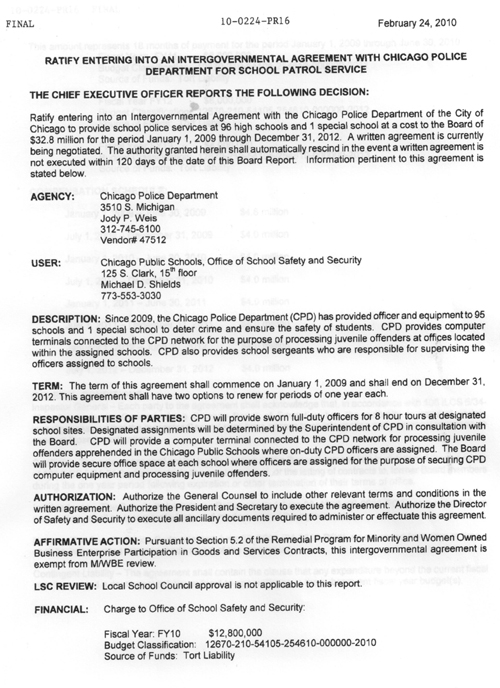 There is no record of the Chicago Public Schools having any obligation to the Chicago Police Department for $70 million on the public record available from the CPS website. In fact, the most recent intergovernmental agreement regarding police services in Chicago schools, noted in the Board Report dated February 24, 2010 and passed by the Chicago Board of Education at its February 24, 2010 meeting, mentions a total obligation (for three years or more) of $32.8 million. During the Power Point presentation at the June 15, 2011 meeting of the Board of Education, the seven members of the Board only asked questions regarding the allegations made by CPS officials about the four percent raise in the contract with the system's unions, ignoring the outrageous claim in the slide (above this graphic) that CPS was facing its "deficit" partly because it was going to have to pay $70 million to the City of Chicago for routine police services between July 1, 2011 and June 30, 2012. Substance graphic from CPS public records, Board Report 10-0224 PR16.None of the assertions made in the presentation were challenged by the Board members, most of whom claim to be financially astute people. Throughout the presentation, the CPS officials who made the presentation overstated the "expenses" they expected the Board to face in FY 2012 (the fiscal year that begins on July 1, 2011 and ends on June 30, 2012. One dramatic example came on Page 4 of the Power Point, where the officials claimed that CPS has to pay the City of Chicago $70 million in FY 2012 for police services in fewer than 100 schools. Leaving aside the question of whether CPS should be paying Chicago police for duties that are routine (and a history that shows former Mayor Richard M. Daley shifted this cost to Chicago's schools almost as soon as he took over CPS in 1995), there is nothing in the public record showing that CPS has to pay anything near this amount. The most recent Board Report passed by the Chicago Board of Education in February 2010 concerning the Intergovernmental Agreement on police services has the Board agreeing to pay $12 million for FY 2010 and the same or less for each fiscal year since, through FY 2013.
There is no record of the Chicago Public Schools having any obligation to the Chicago Police Department for $70 million on the public record available from the CPS website. In fact, the most recent intergovernmental agreement regarding police services in Chicago schools, noted in the Board Report dated February 24, 2010 and passed by the Chicago Board of Education at its February 24, 2010 meeting, mentions a total obligation (for three years or more) of $32.8 million. During the Power Point presentation at the June 15, 2011 meeting of the Board of Education, the seven members of the Board only asked questions regarding the allegations made by CPS officials about the four percent raise in the contract with the system's unions, ignoring the outrageous claim in the slide (above this graphic) that CPS was facing its "deficit" partly because it was going to have to pay $70 million to the City of Chicago for routine police services between July 1, 2011 and June 30, 2012. Substance graphic from CPS public records, Board Report 10-0224 PR16.None of the assertions made in the presentation were challenged by the Board members, most of whom claim to be financially astute people. Throughout the presentation, the CPS officials who made the presentation overstated the "expenses" they expected the Board to face in FY 2012 (the fiscal year that begins on July 1, 2011 and ends on June 30, 2012. One dramatic example came on Page 4 of the Power Point, where the officials claimed that CPS has to pay the City of Chicago $70 million in FY 2012 for police services in fewer than 100 schools. Leaving aside the question of whether CPS should be paying Chicago police for duties that are routine (and a history that shows former Mayor Richard M. Daley shifted this cost to Chicago's schools almost as soon as he took over CPS in 1995), there is nothing in the public record showing that CPS has to pay anything near this amount. The most recent Board Report passed by the Chicago Board of Education in February 2010 concerning the Intergovernmental Agreement on police services has the Board agreeing to pay $12 million for FY 2010 and the same or less for each fiscal year since, through FY 2013.
The three executives presented the nine-page Power Point to the Board. Based on what was presented in the Power Point, the seven members of the Chicago Board of Education, all of whom were at their first public meeting, voted to challenge the eight unions representing CPS workers by voting that CPS did not have enough money to fund the four percent (4%) raised due beginning July 1 to all unionized workers. The raises were part of the final year of a five-year contract negotiated between the Board and its unions during the summer of 2007 and approved by all of the unions by the end of September 2007.
Members of the Board who spoke to reporters and friends all said the same thing. They had no choice but to vote for the confrontation "based on what we were told."
But what if what the Board was told in the brief presentation was mostly fiction, half-truths, and outright lies?
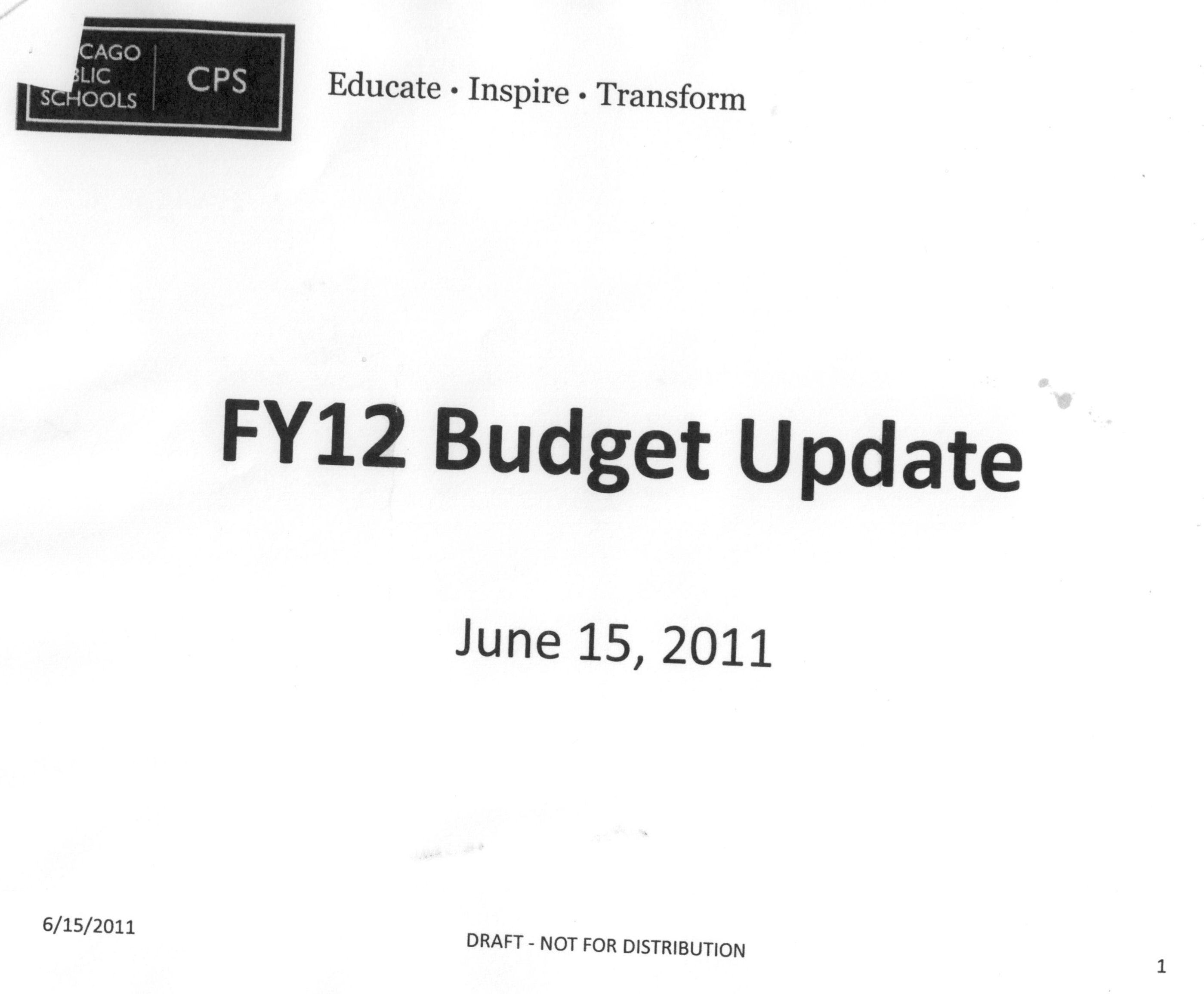 POWER POINT PAGE ONE. This is the first page of the nine-page Power Point presentation that Tim Cawley ("Chief Aministrative Officer"), Melanie Shaker ("Treasurer") and Alicia Winckler ("Chief Human Capital Officer") presented to the newly installed members of the Chicago Board of Education on June 15, 2011.[Editor's Note: From this point on in this story, our illustrations will be the complete Power Point presented on June 15 to the members of the school board, page by page. We hope that our readers will follow this narrative at Substance and make their contributions to the public debate, both here at Substance, within the school worker unions, and insofar as is possible, in the corporate media].
POWER POINT PAGE ONE. This is the first page of the nine-page Power Point presentation that Tim Cawley ("Chief Aministrative Officer"), Melanie Shaker ("Treasurer") and Alicia Winckler ("Chief Human Capital Officer") presented to the newly installed members of the Chicago Board of Education on June 15, 2011.[Editor's Note: From this point on in this story, our illustrations will be the complete Power Point presented on June 15 to the members of the school board, page by page. We hope that our readers will follow this narrative at Substance and make their contributions to the public debate, both here at Substance, within the school worker unions, and insofar as is possible, in the corporate media].
The nine-page Power Point presentation by the brand new "Chief Administrative Officer" of the Chicago Public Schools was designed to carefully script the framing of the narrative so that the Board members (after asking their equally scripted questions, one by one) could tell the press and public that they had to vote the way they did "based on the information we received." But as the claim that CPS will have to pay the Chicago Police Department $70 million is an obvious lie, so does the rest of the Power Point deserve closer scrutiny. This is something the Board members didn't want to do, instead repeating their (often inane) questions.
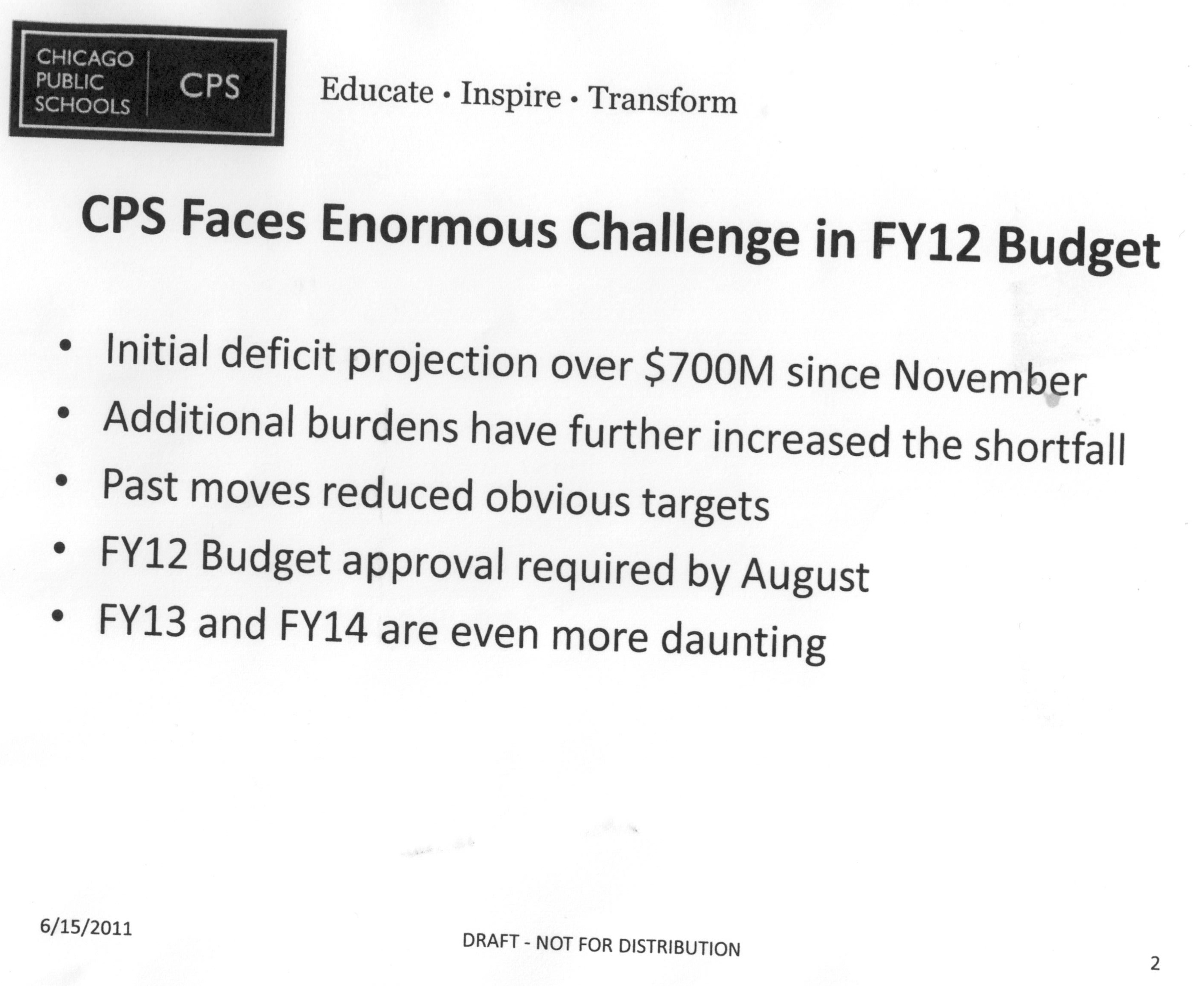 POWER POINT PAGE TWO. On this page, without providing detailed explanations of the three main sources of CPS revenue or expenses, the literary version of reality used for the past four years in CPS budgeting comes into focus. Instead of specific numbers showing trends in State Aid (up for most of the past ten years), local property tax revenues (ditto), and federal aid (now going down a bit because of the end of the Obama administration's stimulus (but still in place to some extent because CPS refused to spend the Educator Jobs money in August and September 2010 on rehiring the teachers it had fired), CPS uses literary terms — "burdens", shortfall, "daunting" — while deliberately not providing the public with numbers and facts. One additional note: CPS made no "initial deficit projection" ($700 million or otherwise) in November 2010, and no claims were made to the public until after the new year.By policy, the Chicago Board of Education is supposed to hold its annual budget hearings in June of each year, prior to the end of the fiscal year. The last time the Chicago Board of Education did that was in the year 2006. Since then, even though they knew virtually everything they would have in the next year's budget, they stalled the hearings until August. By 2010, they didn't even bother to apologize to the public about the stalling, simply holding a series of quickie hearings in August and then rubber stamping the budget that had already been prepared by their staff.
POWER POINT PAGE TWO. On this page, without providing detailed explanations of the three main sources of CPS revenue or expenses, the literary version of reality used for the past four years in CPS budgeting comes into focus. Instead of specific numbers showing trends in State Aid (up for most of the past ten years), local property tax revenues (ditto), and federal aid (now going down a bit because of the end of the Obama administration's stimulus (but still in place to some extent because CPS refused to spend the Educator Jobs money in August and September 2010 on rehiring the teachers it had fired), CPS uses literary terms — "burdens", shortfall, "daunting" — while deliberately not providing the public with numbers and facts. One additional note: CPS made no "initial deficit projection" ($700 million or otherwise) in November 2010, and no claims were made to the public until after the new year.By policy, the Chicago Board of Education is supposed to hold its annual budget hearings in June of each year, prior to the end of the fiscal year. The last time the Chicago Board of Education did that was in the year 2006. Since then, even though they knew virtually everything they would have in the next year's budget, they stalled the hearings until August. By 2010, they didn't even bother to apologize to the public about the stalling, simply holding a series of quickie hearings in August and then rubber stamping the budget that had already been prepared by their staff.
In August 2010, CPS budget officials, for the first time in history, didn't even provide the public with material during the annual budget briefings. Traditionally, the school board had done a summary presentation on the budget, then listened to testimony from members of the public. At the August 2010 hearings, two CPS budget office officials (both of whom are now gone) sat and listened to public testimony. Whenever anyone asked a specific question, the CPS officials told the public that the questions would be answered "later" on the CPS website.
The questions were never answered. In addition to the problems with the tardy hearings and the sphinx-like silence of the CPS budget officials, CPS did not provide copies of the Proposed Budget in sufficient quantities for the public to actually acquire and read the extensive (2,000 page) documents. (More than half the contents of the document was on a CD included in a flap on the back of a lengthy budget book).
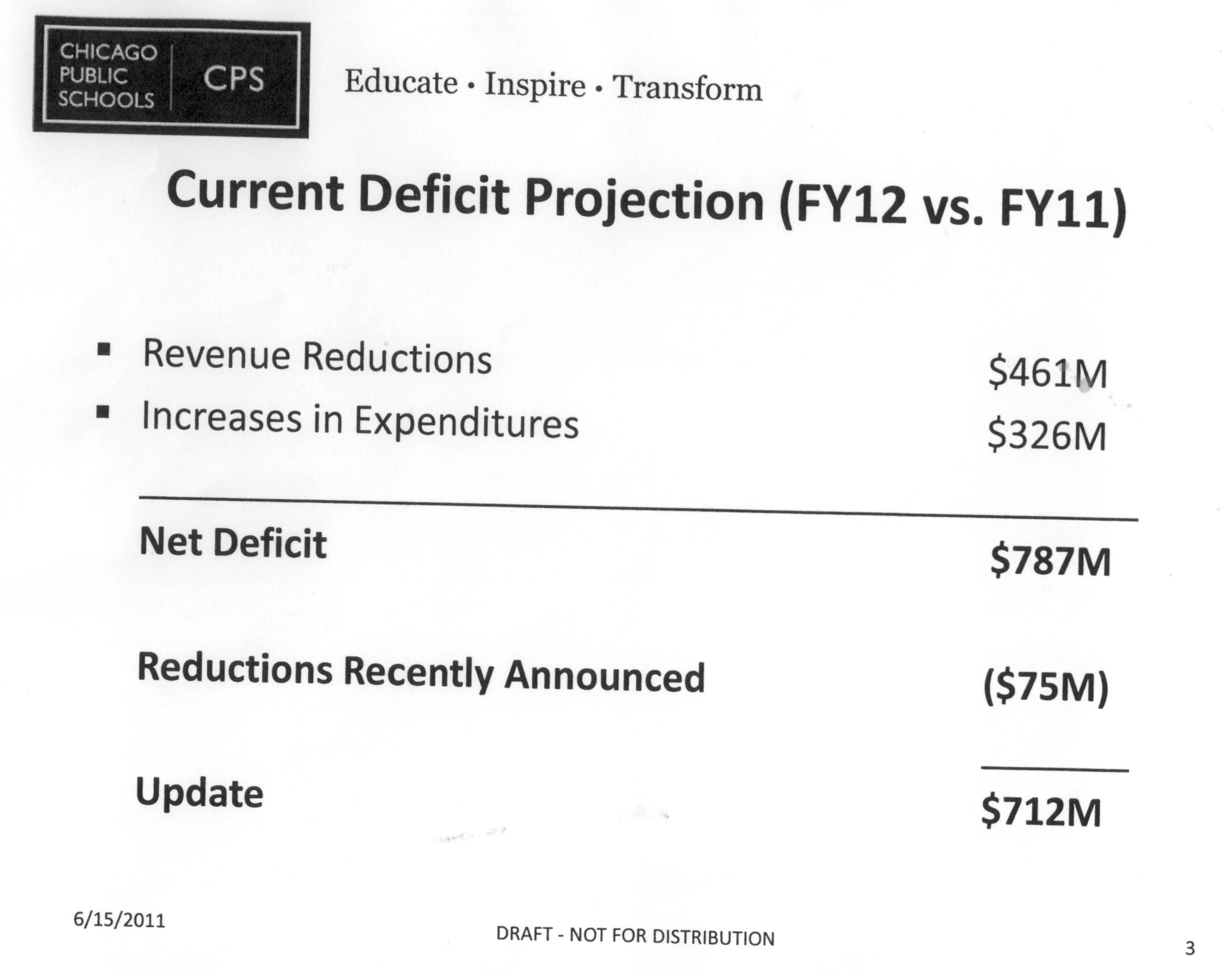 POWER POINT PAGE THREE. The third page of the CPS June 15 Power Point made several assertions about revenues and expenditures that were not explained in enough detail in historical context. Additionally, the slide presented a lie that had previously been circulated by CPS ("Reductions Recently Announced" of $75 million). After Mayor Rahm Emanuel announced that he had cut the City of Chicago budget by $75 million, he ordered CPS to do the same. The mayor and some CPS officials announced that CPS was cutting "central administration" by $75 million, and the claim was duly reported in the press (including a headline in the Chicago Tribune). Actually, less than $20 million of that cut was coming from anything like "central administration." The largest amount of the supposed "cut in administration" ($44 million) was from a hope-for restructuring of CPS bonds. During the June 15 discussion, CPS narrators went into the usual metaphors about cutting "fat," and then "muscle" but none of the members of the Board challenged the claim that the earlier "reductions" had been mostly fiction.A group of teachers, some of whom eventually went to work for the Chicago Teachers Union, spent more than a week pouring over the enormous 2,000 page "Proposed Budget." Earlier in the summer, CPS had announced that it had cut "central administration" when in fact the fine print showed that most of the people who had lost their jobs were teachers who had been put into CPS spreadsheets in a section called "Citywide". Contrary to the claims by then CEO Ron Huberman that "Citywide" cuts were cuts in "administration," more than 90 percent of the people who lost their jobs between June and September 2010 were teachers, psychologists, social workers, and other full-time teachers working with children every day.
POWER POINT PAGE THREE. The third page of the CPS June 15 Power Point made several assertions about revenues and expenditures that were not explained in enough detail in historical context. Additionally, the slide presented a lie that had previously been circulated by CPS ("Reductions Recently Announced" of $75 million). After Mayor Rahm Emanuel announced that he had cut the City of Chicago budget by $75 million, he ordered CPS to do the same. The mayor and some CPS officials announced that CPS was cutting "central administration" by $75 million, and the claim was duly reported in the press (including a headline in the Chicago Tribune). Actually, less than $20 million of that cut was coming from anything like "central administration." The largest amount of the supposed "cut in administration" ($44 million) was from a hope-for restructuring of CPS bonds. During the June 15 discussion, CPS narrators went into the usual metaphors about cutting "fat," and then "muscle" but none of the members of the Board challenged the claim that the earlier "reductions" had been mostly fiction.A group of teachers, some of whom eventually went to work for the Chicago Teachers Union, spent more than a week pouring over the enormous 2,000 page "Proposed Budget." Earlier in the summer, CPS had announced that it had cut "central administration" when in fact the fine print showed that most of the people who had lost their jobs were teachers who had been put into CPS spreadsheets in a section called "Citywide". Contrary to the claims by then CEO Ron Huberman that "Citywide" cuts were cuts in "administration," more than 90 percent of the people who lost their jobs between June and September 2010 were teachers, psychologists, social workers, and other full-time teachers working with children every day.
One of the signal features of the way CPS has been telling the public about its budgets for the past several years has been the lack of numerical precision. Words that are used to describe the budget every winter and spring tend in the direction of less and less precision. For example, CPS officials have been avoiding using the word "deficit" because it tends to have a precise term in accounting, instead choosing inaccurate synonyms like "shortfall" or "projected shortfall." Because the corporate media in Chicago has stripped itself of reporters as part of its own restructuring, only one or two of the reporters regularly covering the schools might remember any of the previous versions of budgetary reality propounded by CPS.
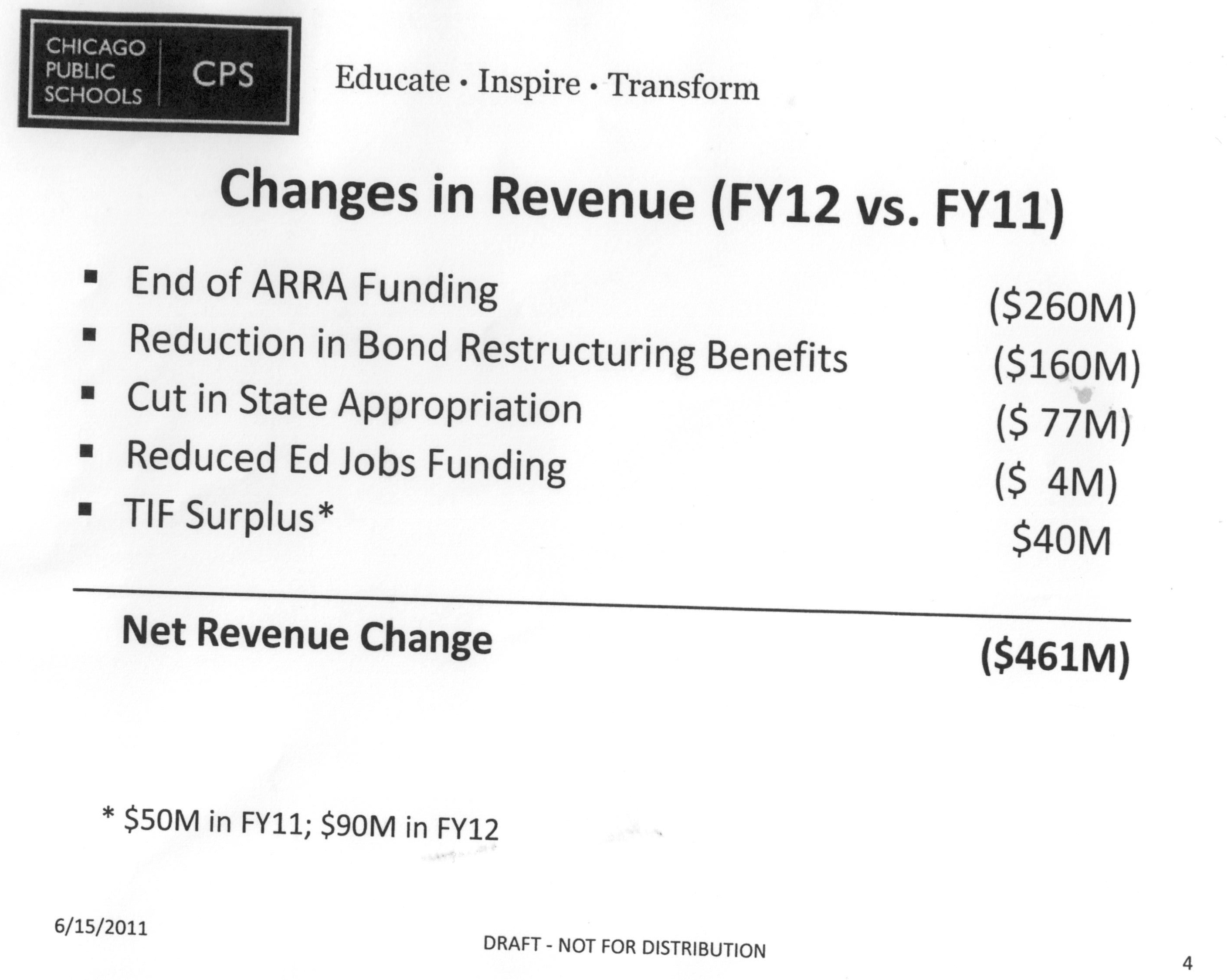 POWER POINT PAGE FOUR: One of the most confusing of the generally confusing slides used during the June 15 narrative to the seven members of the Chicago Board of Education claimed to illustrate "Changes in Revenue" from the 2010 - 2011 school year into the upcoming 2011 - 2012 school year. None of the "changes" on the slide was explained in detail with written fact. Instead, CPS Chief Administrative Officer tim Cawley told the members of the Board how the numbers had come about. Nobody among the supposedly sophisticated business experienced Board members asked for details about the "Reduction in Bond Restructuring Benefits" — or asked any other questions about the costs of CPS borrowing. Cawley treated the Board members to a bizarre rendition of "Reduced Ed Jobs Funding," a part of the talk that was left outside its specific historical context. Cawley seemed to say that CPS had spent half the $104 million Ed Jobs dollars allocated by a special act of Congress in August 2010, but couldn't be precise about how much, and nobody asked how the slide said "4 million" when the number seemed to be a reduction of $50 million accompanied by revenue of $54 million. In the past five years, the Chicago Tribune has had six reporters covering education. By 2007, three of them had taken a buyout. One later left for The Wall Street Journal, which still believes in covering major news centers such as Chicago's public schools (she was covering the June 15, 2011 CPS Board meeting). The current Tribune reporter, who has to cover everything in the Chicago schools and all of the materials issued by the Board of Education, is overworked and without the resources to ask the detailed questions budget jargon requires. The Sun-Times has had more stability in its coverage, but because of the bias of its main editorial writers (see the editorial on June 16, 2011, the day after the special Board meeting), the facts don't matter.
POWER POINT PAGE FOUR: One of the most confusing of the generally confusing slides used during the June 15 narrative to the seven members of the Chicago Board of Education claimed to illustrate "Changes in Revenue" from the 2010 - 2011 school year into the upcoming 2011 - 2012 school year. None of the "changes" on the slide was explained in detail with written fact. Instead, CPS Chief Administrative Officer tim Cawley told the members of the Board how the numbers had come about. Nobody among the supposedly sophisticated business experienced Board members asked for details about the "Reduction in Bond Restructuring Benefits" — or asked any other questions about the costs of CPS borrowing. Cawley treated the Board members to a bizarre rendition of "Reduced Ed Jobs Funding," a part of the talk that was left outside its specific historical context. Cawley seemed to say that CPS had spent half the $104 million Ed Jobs dollars allocated by a special act of Congress in August 2010, but couldn't be precise about how much, and nobody asked how the slide said "4 million" when the number seemed to be a reduction of $50 million accompanied by revenue of $54 million. In the past five years, the Chicago Tribune has had six reporters covering education. By 2007, three of them had taken a buyout. One later left for The Wall Street Journal, which still believes in covering major news centers such as Chicago's public schools (she was covering the June 15, 2011 CPS Board meeting). The current Tribune reporter, who has to cover everything in the Chicago schools and all of the materials issued by the Board of Education, is overworked and without the resources to ask the detailed questions budget jargon requires. The Sun-Times has had more stability in its coverage, but because of the bias of its main editorial writers (see the editorial on June 16, 2011, the day after the special Board meeting), the facts don't matter.
At the same time the major corporate news organizations began refusing to do more than recycle talking points from the CPS narrative, Chicago's "philanthropic community" has wiped out the major independent critics of the budget fictions through massive "defunding." Two of the most important groups that once provided sustained professional critical analysis of Chicago's school spending — the Neighborhood Capital Budget Group and the Cross City Campaign — were wiped out when Chicago charities, after vetting their programs with Arne Duncan and the mayor's office, refused to provide them with funding. By 2008, both groups were out of business because they had depended on the same corporate leaders who were directing the narrative in one direction. The NCBD provided much of the original research that was used by Reader reporter Ben Joravsky in his lengthy and ongoing exposure of the city's TIF scandals. The last time the Cross City Campaign's researchers analyzed a budget, their presentation at the June 2006 budget hearings declared the Proposed CPS budget for fiscal 2007 the "murkiest" and least accessible in history.
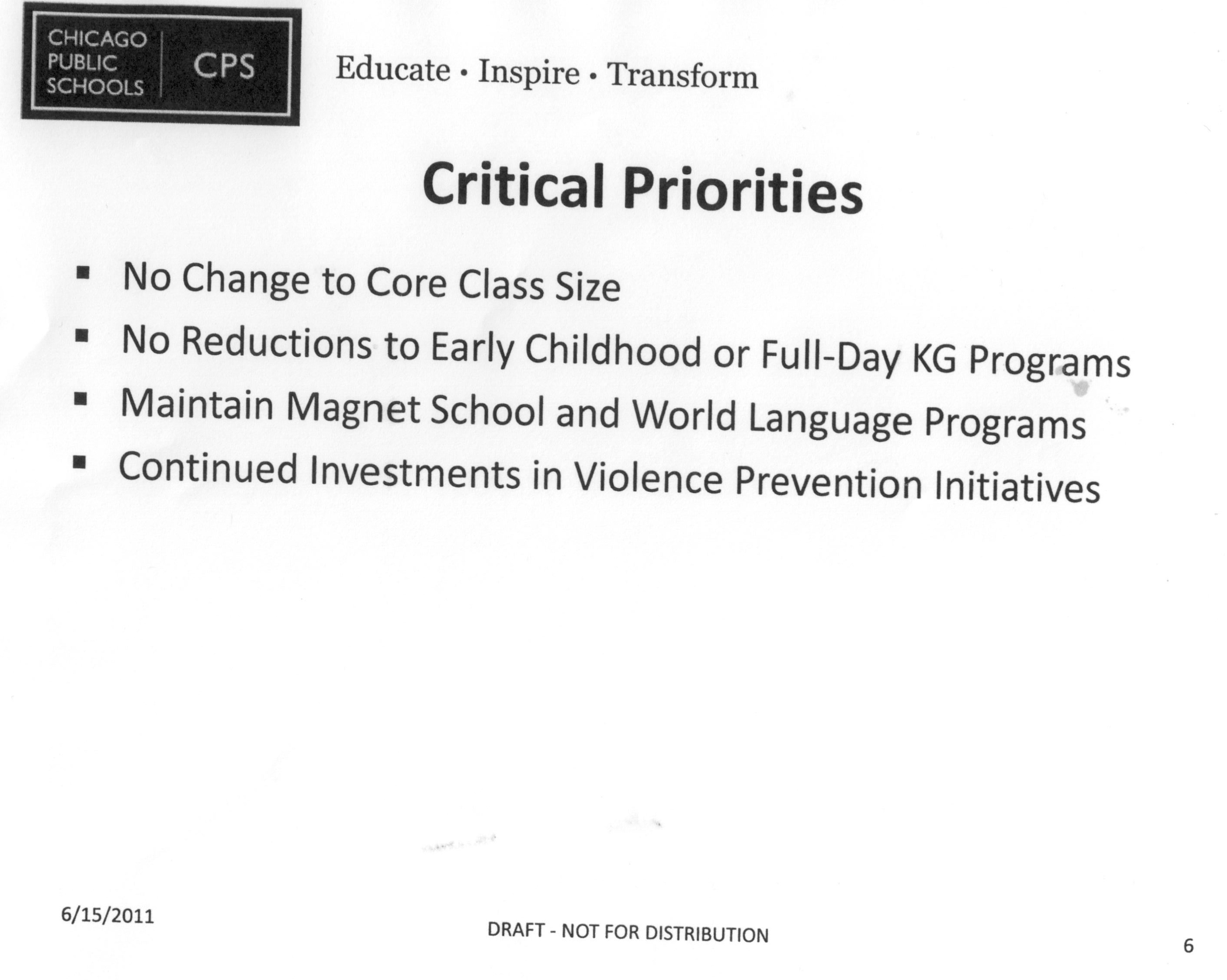 POWER POINT PAGE SIX: While the Board claimed to be setting "critical priorities," there was little or no discussion of the numbers behind them. "Continued Ivestments in Violence Prevention Programs" is undefined, and has never mentioned the massive drug gangs that operate with impunity in many parts of Chicago (one version of the problem of "violence" among young people in Chicago has managed to claim it is a "health" issue and avoids mentioning the drug gangs — from the Black P. Stones and Gangster Disciples to the Latin Kings and Maniac Latin Disciples — that every child has to know about to survive in Chicago's poorer communities. The controversial "Culture of Calm" program (a patronage program established under former CEO Ron Huberman amid a mixture of statistical mumbo jumbo) which had been funded with $65 million in federal dollars is apparently being continued at a cost of tens of millions of dollars, even though it has never been audited or studied, resulting in anecdotal claims and potential scandals that should involve several investigations by the Inspector General. One year later, both NCBG and Cross City were out of business, having been told by the city's funders that their work was no longer relevant to the future of Chicago as a global city.
POWER POINT PAGE SIX: While the Board claimed to be setting "critical priorities," there was little or no discussion of the numbers behind them. "Continued Ivestments in Violence Prevention Programs" is undefined, and has never mentioned the massive drug gangs that operate with impunity in many parts of Chicago (one version of the problem of "violence" among young people in Chicago has managed to claim it is a "health" issue and avoids mentioning the drug gangs — from the Black P. Stones and Gangster Disciples to the Latin Kings and Maniac Latin Disciples — that every child has to know about to survive in Chicago's poorer communities. The controversial "Culture of Calm" program (a patronage program established under former CEO Ron Huberman amid a mixture of statistical mumbo jumbo) which had been funded with $65 million in federal dollars is apparently being continued at a cost of tens of millions of dollars, even though it has never been audited or studied, resulting in anecdotal claims and potential scandals that should involve several investigations by the Inspector General. One year later, both NCBG and Cross City were out of business, having been told by the city's funders that their work was no longer relevant to the future of Chicago as a global city.
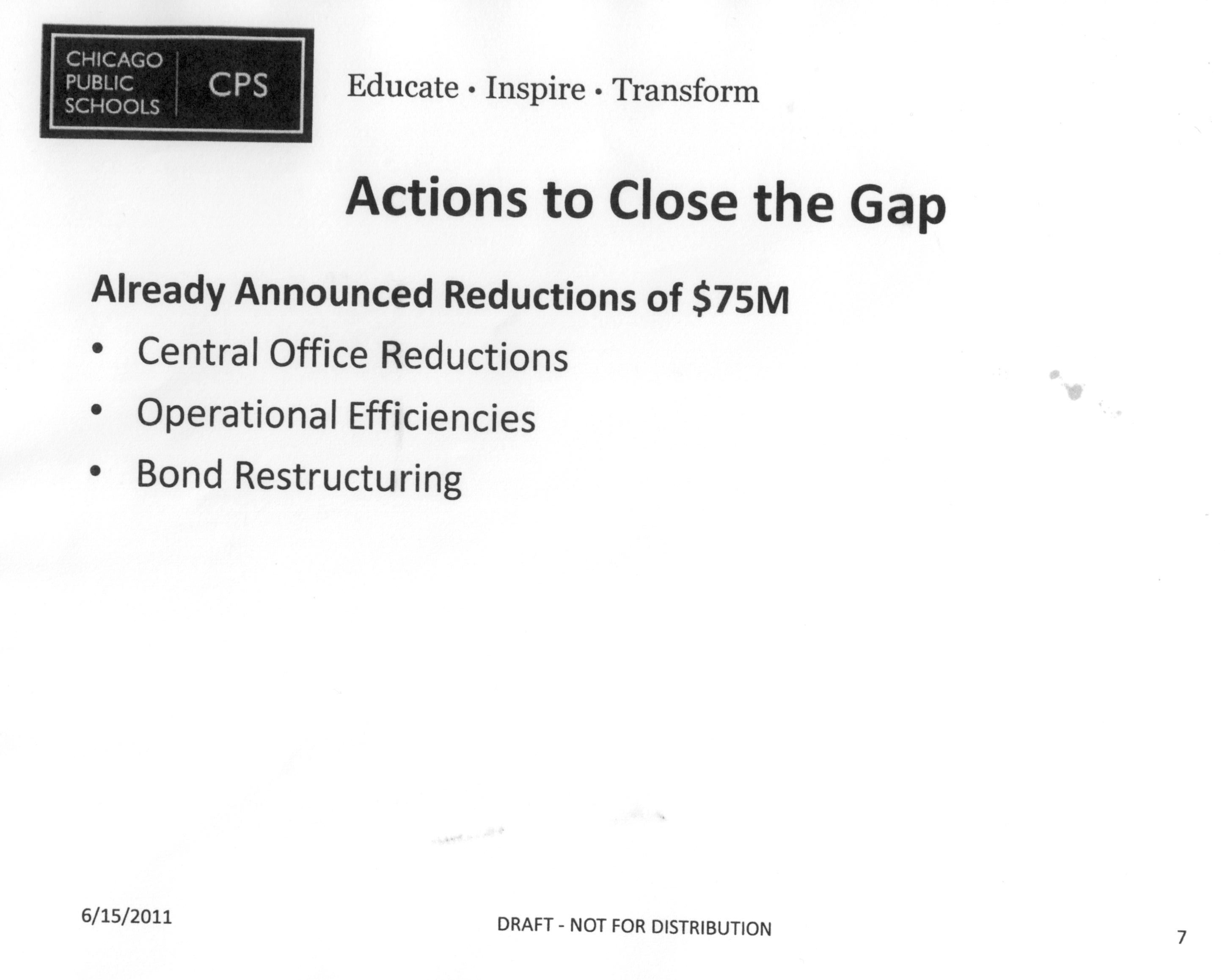 POWER POINT PAGE SEVEN. By this page, CPS does get around to discussing what was originally reported as "central office cuts", but without numbers. During the narrative, the narrators deftly avoided mentioning that some of the cuts were to student bus service (much of which will not cut from the enormous annual overhead caused by the outsourcing of the management of the bus routes to a corporate in Kansas City) or to cleaning certain buildings (based on often inaccurate claims from the central office about "underutilized" buildings).
POWER POINT PAGE SEVEN. By this page, CPS does get around to discussing what was originally reported as "central office cuts", but without numbers. During the narrative, the narrators deftly avoided mentioning that some of the cuts were to student bus service (much of which will not cut from the enormous annual overhead caused by the outsourcing of the management of the bus routes to a corporate in Kansas City) or to cleaning certain buildings (based on often inaccurate claims from the central office about "underutilized" buildings).
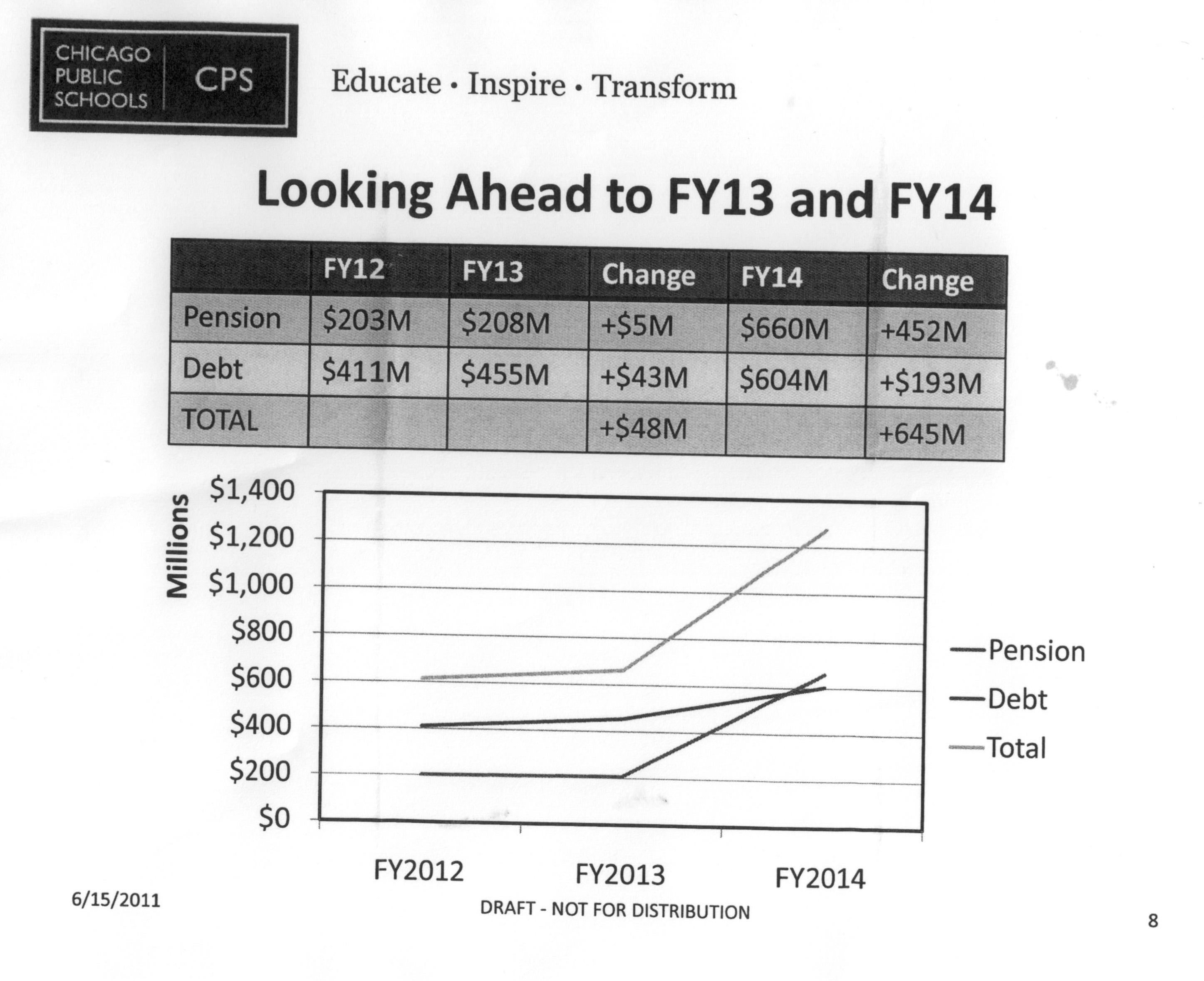 POWER POINT PAGE EIGHT. Once again, CPS is ignoring its obligations to fully fund the Chicago Teachers Pension Fund (CTPF) and reopening its front in the war against the defined benefit pension plans of public workers. The attack on the teachers' pension fund was begun during the 2007 budget hearings, when CPS began to claim that it could not afford its contractual obligations to the fund without threatening the schools. That attack continued in 2008 and reached its peak in April 2010, when then Chief Executive Officer Ron Huberman told the President of the Illinois Senate that Chicago schools wouldn't open unless the Illinois General Assembly gave CPS a three year, $1.2 billion ($400 million per year) relief from its obligations.
POWER POINT PAGE EIGHT. Once again, CPS is ignoring its obligations to fully fund the Chicago Teachers Pension Fund (CTPF) and reopening its front in the war against the defined benefit pension plans of public workers. The attack on the teachers' pension fund was begun during the 2007 budget hearings, when CPS began to claim that it could not afford its contractual obligations to the fund without threatening the schools. That attack continued in 2008 and reached its peak in April 2010, when then Chief Executive Officer Ron Huberman told the President of the Illinois Senate that Chicago schools wouldn't open unless the Illinois General Assembly gave CPS a three year, $1.2 billion ($400 million per year) relief from its obligations.
 Once again, CPS is scheduling its public release of the budget for August, instead of June as required.
Once again, CPS is scheduling its public release of the budget for August, instead of June as required.
Comments:
By: Bob Busch
Did the contract have a loophole?
Loophole
We all should not be surprised by the Board's action. In 2007, the former CTU leadership left a giant loophole in the five-year contract. For the years 2011 and 2012, the Board does not have to grant the raise if they claim they cannot pay for the 4%. So much as it galls me, I
don’t think we have a chance in court. I wish our present CTU leaders would realize that and not reopen the Contract
By: Rod Estvan
CPS power point presentation
George is completely correct on the issue of the inflated payment to the CPD. It should also be noted that there was no discussion even in passing in the presentation by Tim Cawley of a property tax increase. It was as if such an option did not even exist as a way to generate revenue.
Rod Estvan
By: Jason Glenn
CPS budget concerns:
If CPS is so concerned about money being wasted they should look at the procedures and staff that is required to fight legal battles and investigations that seem to go on forever. If CPS wants to save money it should look at these costs and how cutting them will save CPS millions per year.


By: Sarah Loftus
Cut outside consultants, vendors, lawyers, etc. ,etc...
to continue with this...All CPS contracts with vendors, consultants, lawyers, 'educational experts', universities, utility companies, charter schools and their corporate sponsors, etc should have their contracts cut.